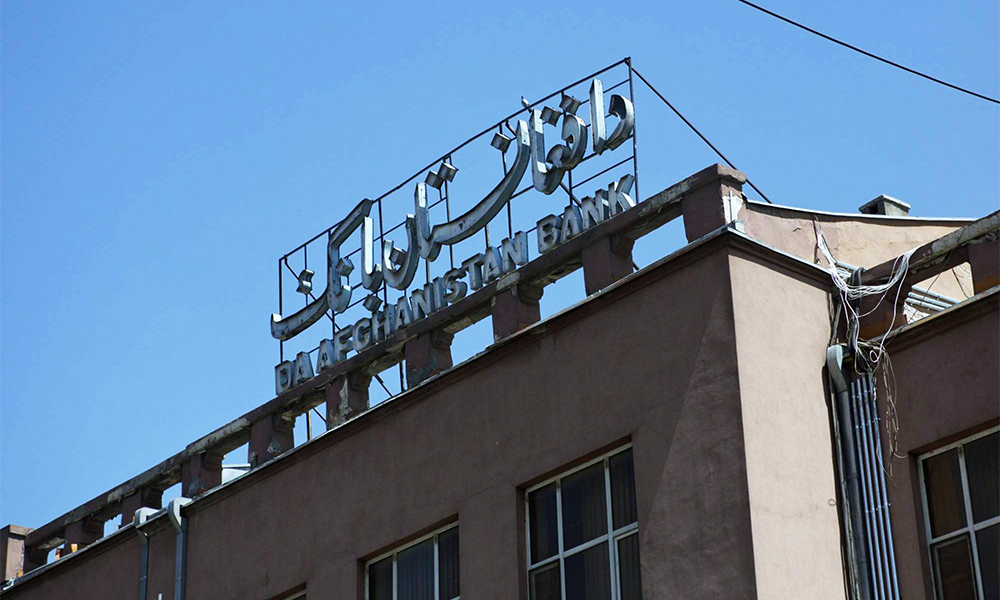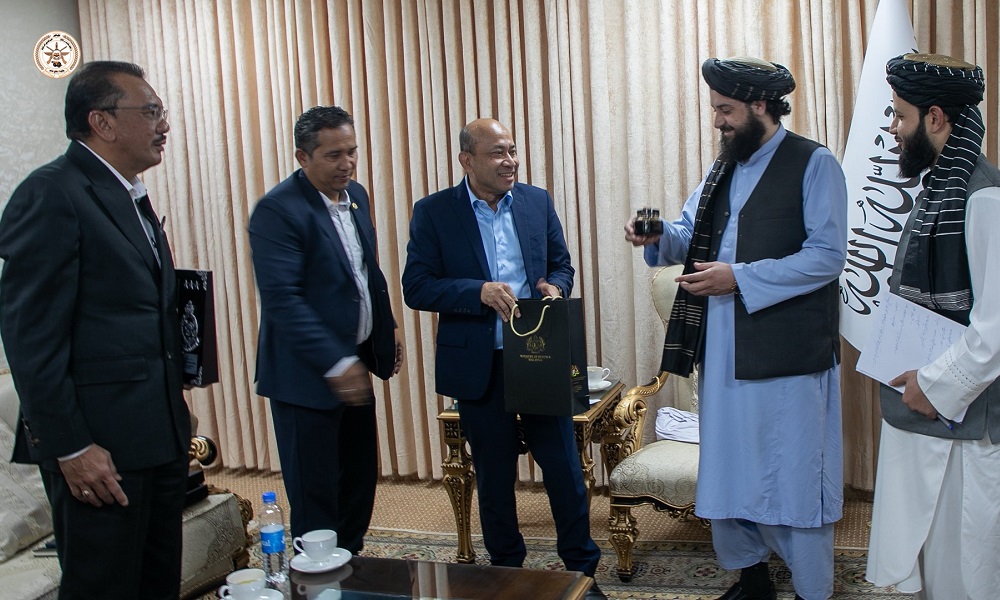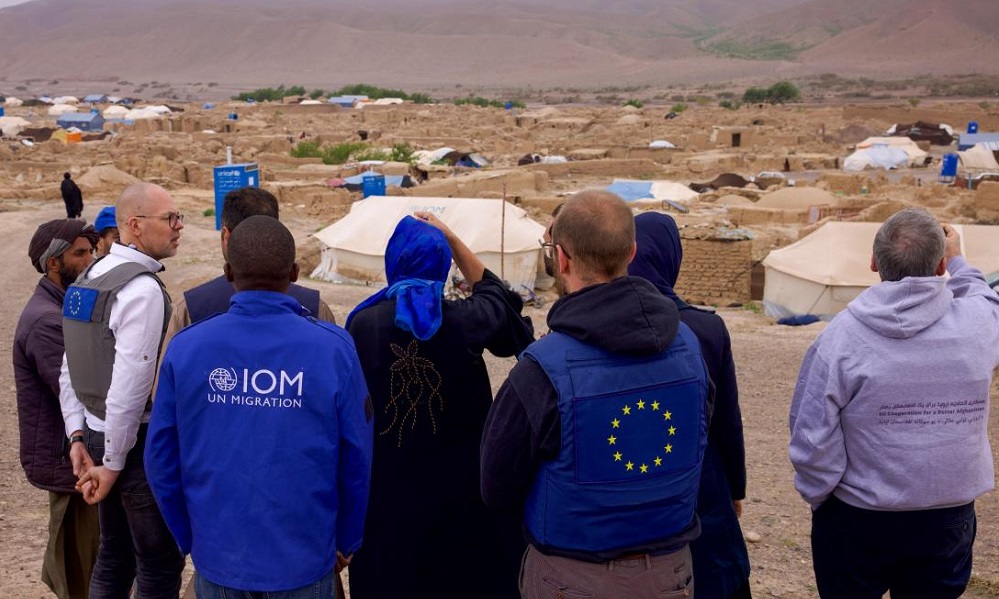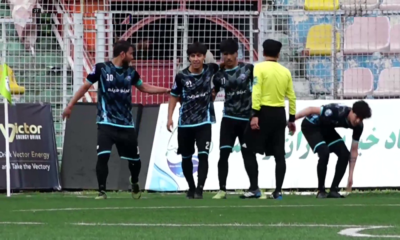Latest News
Afghan central bank drained dollar stockpile before Kabul fell

The Afghan central bank ran down most of its U.S. dollar cash reserves in the weeks before the Taliban took control of the country, according to an assessment prepared for Afghanistan’s international donors, exacerbating the current economic crisis.
The confidential, two-page brief, written early this month by senior international economic officials for institutions including the World Bank and International Monetary Fund, said the country’s severe cash shortage began before the Islamic Emirate of Afghanistan (IEA) took control of Kabul, Reuters reported.
It criticised how the central bank’s former leadership handled the crisis in the months before the IEA’s conquest, including decisions to auction unusually large amounts of U.S. dollars and move money from Kabul to provincial branches.
“FX (foreign exchange) reserves in CB’s (central bank) vaults in Kabul have depleted, the CB cannot meet … cash requests,” the report, seen by Reuters, said.
“The biggest source of the problem is the mismanagement at the central bank prior to the Taliban (IEA) takeover,” it added.
Shah Mehrabi, chairman of the central bank’s audit committee who helped oversee the bank before the IEA took over and is still in his post, defended the central bank’s actions, saying it was trying to prevent a run on the local Afghani currency.
The extent of the cash shortage can be seen on the streets of Afghan cities, where people have been queuing for hours to withdraw dollar savings amid strict limits on how much they can take out.
Even before the shock of the Western-backed government’s collapse, the economy was struggling, but the return of the IEA and abrupt end of billions of dollars in foreign aid has left it in deep crisis.
Prices for staples like flour have spiralled while work has dried up, leaving millions facing hunger as winter approaches.
Aid dries up
Under the previous government, the central bank relied on cash shipments of $249 million, delivered roughly every three months in boxes of bound $100 notes and stored in the vaults of the central bank and presidential palace, according to three people with direct knowledge of the matter.
That money has dried up as foreign powers shy away from dealing directly with the IEA.
The central bank, which plays a key role in Afghanistan because it distributes aid from countries like the United States, said on Wednesday it had finalised a plan to meet the country’s foreign currency needs. It gave no details.
The hard currency crunch is making it difficult for the IEA to meet basic needs, including paying for power or dispersing salaries to government employees, many of whom have not been paid in months.
Afghanistan’s roughly $9 billion of offshore reserves were frozen as soon as the IEA captured Kabul, leaving the central bank with just the cash in its vaults.
According to the report, the central bank auctioned off $1.5 billion between June 1 and August 15 to local foreign exchange dealers, which it said was “strikingly high”.
“By August 15, the Central Bank had an outstanding liability of $700 million and 50 billion Afghanis ($569 million) towards the commercial banks,” it said, adding that this had been a major factor in emptying its coffers.
Afghan central bank official Mehrabi said, however, that although almost $1.5 billion of auctions had been announced, the actual amount sold was $714 million.
He said the central bank had “continued its foreign exchange auction to reduce the depreciation and inflation.”
Money missing?
The report also questioned a decision by the central bank to shift some of its reserves to provincial branches, putting it at risk as IEA forces made advances across the country from late 2020 in the runup to their victory.
It said around $202 million was kept in these branches at the end of 2020, compared with $12.9 million in 2019, and that the cash was not moved as provinces started to fall to the IEA.
“Some money is reportedly lost (stolen) from ‘some’ of the provincial branches,” the report said, without specifying how much.
Mehrabi said the central bank was investigating money “stolen” from three of its branches, although not by the IEA. He gave no further details.
Former central bank governor Ajmal Ahmady, who left the country the day after Kabul fell, did not respond to emails and other messages requesting comment on his and the bank’s actions in the months before the IEA returned to power.
Ahmady has said on Twitter in recent weeks that he did his best to manage the situation, and blamed any cash shortfall on the freezing of central bank assets abroad.
In his statements, he also said the central bank had managed the economy well prior to the fall of Kabul and that he felt bad about leaving staff behind but feared for his safety. He has said no money was stolen from any reserve account.
Latest News
Tripartite trade meeting held in Kabul to boost regional connectivity

A tripartite meeting between the delegations of Afghanistan, Turkmenistan and Kazakhstan was held in Kabul with the aim of connecting North Asia to South Asia and reducing transit and transportation costs among these three countries, the Ministry of Trade and Commerce said in a statement.
In this meeting, an agreement was reached on the creation of a joint technical committee to continue the talks.
This tripartite meeting was held under the leadership of Nooruddin Azizi, the Acting Minister of Industry and Commerce, Vice President of Turkmenistan and Srik Zhumangarin, the Deputy Prime Minister of Kazakhstan.
Earlier, a bilateral meeting was held between the delegation of the Islamic Emirate and Turkmenistan. The ministry of commerce said the participants of the meeting discussed the construction of a large joint logistics center in Torghondi, the trilateral transit agreement between the IEA, Turkmenistan, and Kazakhstan, the expansion of Afghanistan’s railway, solving issues related to Afghan transit and export goods, and a number of other commercial issues.
Latest News
No destructive groups including Daesh present in Afghanistan: Yaqub Mujahid

Acting Minister of National Defense Mohammad Yaqub Mujahid has said that no destructive groups including Daesh have physical presence in Afghanistan, adding the Islamic Emirate of Afghanistan (IEA) will not allow anyone to pose threat to any country in the region from the Afghan soil.
Mujahid made the remarks in a meeting with a delegation from Malaysia in Kabul on Thursday.
According to a statement released by the Ministry of Defense, Mujahid highlighted Malaysia’s “good treatment” of Afghan refugees and its long-standing relations with Afghanistan, and said that Malaysia is a powerful Islamic country and visits should increase.
He added that with the establishment of the Islamic Emirate, occupation and war ended in Afghanistan, and the country is fully secure.
Based on the statement, the Malaysian delegation called Afghanistan a friendly country and while emphasizing on comprehensive cooperation, it assured that what they have seen in Afghanistan will be shared with the authorities of their country.
Latest News
EU allocates 17 million euros to support Afghans on the move

The European Union signed an agreement worth 17 million euros with the International Organization for Migration (IOM) to improve access to basic services, increased economic opportunities and protection for Afghans on the move and their host communities in Afghanistan.
The needs of women and girls are a particular focus of the programme, EU said in a statement released on Thursday.
The statement noted that from January 2023 until April 2024, over 1.5 million Afghans returned from Pakistan and Iran.
“I am deeply moved by the hardship returnees face when being deported to Afghanistan. In a country suffering from poverty and climate change, and in a city that just saw devastating earthquakes, this truly is a crisis within a crisis.”, said Peteris Ustubs, Director for the Middle East, Asia and Pacific of the European Commission’s Department for International Partnerships during the signing ceremony at the IOM transit centre in Herat.
Raffaella Iodice, EU Chargée d’Affaires a.i. to Afghanistan, added “The solidarity of the Afghan people towards their brothers and sisters is an inspiration. We must assure that communities hosting and helping new arrivals are supported. The partnership with IOM ensures access to essential services and provides protection for Afghan returnees and their host communities. As women and girls can be particularly affected, we make sure that all members of society can benefit”.
“IOM’s continued partnership with the EU has been critical in enabling our teams to reach hundreds of thousands of Afghan returnees and other vulnerable communities in the country”, said IOM Afghanistan Chief of Mission, Maria Moita. “Thanks to this renewed commitment, we will be able to focus on addressing the immense challenges in the areas of return and contribute to reintegration, social cohesion, and longer-term solutions for those communities.”
This additional contribution is part of a 5-year programme that is being implemented across Afghanistan and in four countries in the region. It builds on the EU’s previous support to IOM to improve the wellbeing of Afghans forced to return to the country, EU said.
-

 Latest News3 days ago
Latest News3 days agoRashid Khan named AWCC’s brand ambassador
-

 Regional4 days ago
Regional4 days agoIranian president lands in Pakistan for three-day visit to mend ties
-

 Sport4 days ago
Sport4 days agoKolkata beat Bengaluru by one run in IPL as Kohli fumes at dismissal
-

 Sport5 days ago
Sport5 days agoACL: Aino Mina 3-0 Istiqlal Kabul; Attack Energy 3-0 Khadim
-

 Climate Change5 days ago
Climate Change5 days agoRescuers race to reach those trapped by floods in China’s Guangdong
-

 World4 days ago
World4 days agoMalaysian navy helicopters collide in mid-air, 10 killed
-

 Sport3 days ago
Sport3 days agoJaiswal ton powers Rajasthan to big IPL win
-

 Sport4 days ago
Sport4 days agoMawj Sahil player scores stunning halfway line goal in 1-0 win over Jawanan Wahedi
























